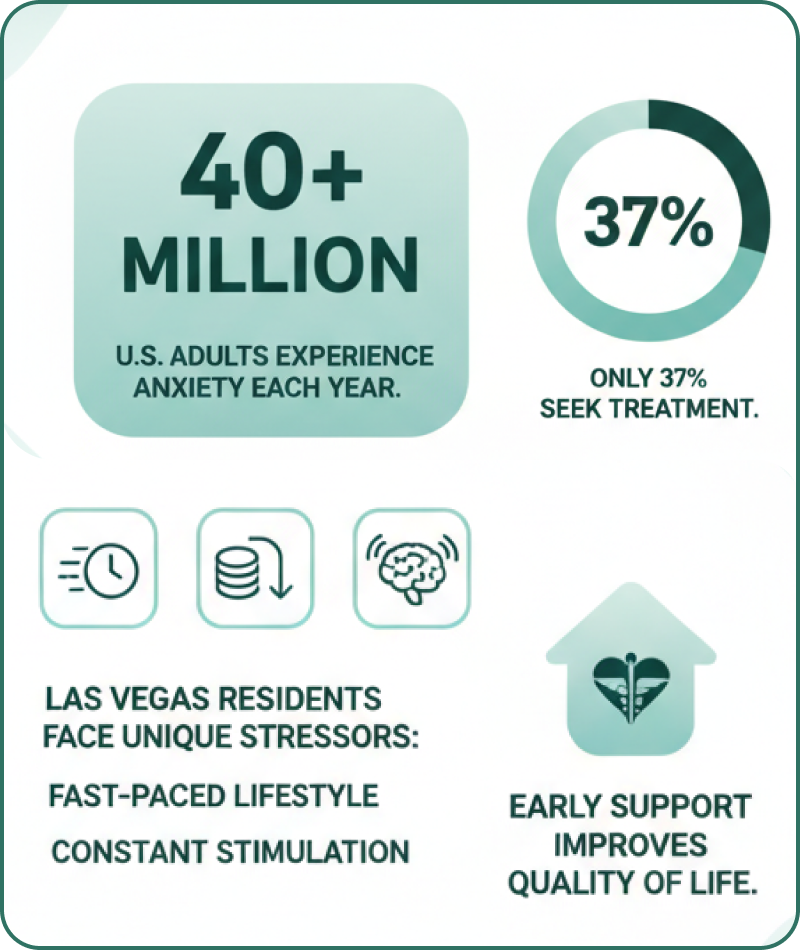What Is Xanax and Why Is It Commonly Prescribed?
Xanax, also known by its generic name alprazolam, is a prescription medication used to treat anxiety and panic disorders. As a benzodiazepine, it works by calming the central nervous system and providing fast relief from acute stress and anxiety. While highly effective for short-term use, Xanax can become addictive when misused or taken over a long period. Many individuals begin taking Xanax as prescribed—often from a family member’s medicine cabinet—without realizing how quickly physical dependence can develop.
.png)
Understanding Xanax Addiction
Xanax is considered highly addictive, especially when taken in higher doses or without medical supervision. Addiction can develop even when users follow a prescription, as the body builds a tolerance over time. This often leads to alprazolam misuse and drug-seeking behavior. Physical dependence may appear first, but over time, psychological addiction and compulsive drug use may follow. Risk factors for Xanax addiction include a personal or family history of substance use disorders, underlying mental health conditions, and stress-related life events.
.png)
Signs and Symptoms of Xanax Addiction
Recognizing the symptoms of Xanax addiction is critical for early intervention. Some of the most common signs include:
- Slurred speech or drowsiness
- Mood swings or irritability
- Cognitive impairment or confusion
- Drug-seeking behavior
- Withdrawing from social or personal responsibilities
- Taking higher doses than prescribed
- Combining Xanax with other drugs or alcohol to intensify effects
These symptoms often escalate and can lead to dangerous health consequences, including overdose and respiratory depression.
.png)
Xanax Withdrawal Symptoms and Health Risks
Xanax withdrawal can be severe and even life-threatening without medical support. Common withdrawal symptoms include:
- Rebound anxiety or panic attacks
- Insomnia or vivid nightmares
- Tremors and muscle pain
- Seizures or hallucinations in extreme cases
- Emotional instability and suicidal thoughts
The process of withdrawal impacts both physical and mental health. For this reason, detoxing from Xanax should always be done under professional medical supervision to manage symptoms safely and effectively.
.png)
The Link Between Xanax Addiction and Mental Health Conditions
Xanax addiction often coexists with untreated mental health conditions such as anxiety disorders, bipolar disorder, and panic disorders. Individuals may initially take Xanax to cope with overwhelming emotions or recurring panic attacks. However, long-term use can worsen these mental disorders and create a cycle of dependency. Treating Xanax addiction without addressing the underlying psychological factors increases the risk of relapse and continued drug use.
Xanax Use and the Increased Risk of Addiction
Xanax, also known as alprazolam tablets, is a fast-acting benzodiazepine prescribed to treat anxiety and panic disorders. However, frequent Xanax use can lead to an increased risk of physical dependence and eventual benzodiazepine addiction. Many individuals unknowingly begin using Xanax from a family’s medicine cabinet, unaware of how Xanax is addictive, especially when used without medical guidance. Over time, the drug alters brain function, making it difficult to function without it. What starts as a short-term solution can quickly escalate into compulsive drug use with negative consequences for both mental and physical health. Recognizing early signs of dependency is critical to preventing a full-blown addiction.
The Dangers of Self-Medicating with Xanax
Many people turn to Xanax use to find immediate relief from anxiety or stress, but self-medicating often leads to unintended consequences. Taking alprazolam tablets without a prescription—especially in combination with other benzodiazepines or substances—increases the likelihood of Xanax overdose and worsened brain function. Beyond the physical symptoms, users may experience memory loss, impaired judgment, and strained relationships. Over time, the negative consequences compound, making it even harder to overcome addiction. Families should be cautious about unsecured prescriptions in the medicine cabinet, as they may unknowingly contribute to misuse. Seeking professional help is the safest path to recovery.
.png)
Treating Xanax Addiction at Our Las Vegas Treatment Center
At Halo Mental Health in Las Vegas, we provide personalized treatment options to help individuals overcome Xanax addiction and reclaim their lives. Our outpatient treatment programs offer:
- Medically assisted detox and withdrawal management
- Medication-assisted treatment (MAT) when appropriate
- Structured therapy sessions
- Treatment plans tailored to each individual’s needs
- Support for co-occurring mental health conditions
Our experienced healthcare providers work closely with clients to monitor progress and ensure a safe, supportive recovery experience.
.png)
Behavioral Therapies and Coping Strategies
Therapeutic support is a vital part of recovering from Xanax addiction. At Halo, we offer cognitive behavioral therapy (CBT), dialectical behavior therapy (DBT), and trauma-informed care to help clients:
- Identify triggers and patterns of drug use
- Build healthy coping strategies
- Manage anxiety and stress without medication
- Rebuild trust in personal relationships
- Improve emotional regulation
Family involvement is also encouraged, as the support of loved ones plays a crucial role in long-term recovery.
Why Medical Supervision Matters in Xanax Withdrawal
Withdrawing from Xanax without medical supervision can be dangerous. Because Xanax is addictive, quitting suddenly can cause severe physical symptoms like tremors, confusion, and even seizures. These symptoms are common in cases of benzodiazepine addiction, especially when higher doses or other benzodiazepines have also been used. Tapering under clinical care can ease withdrawal symptoms and prevent complications like a Xanax overdose. At Halo Mental Health, we create personalized detox plans that support safe and gradual withdrawal while addressing underlying mental health concerns. This approach allows clients to stabilize both physically and emotionally as they begin the process to overcome addiction.
.png)
What to Expect During the Recovery Process
Recovering from benzodiazepine dependence takes time, patience, and professional guidance. The recovery process often includes:
- Early intervention and stabilization
- Medically supervised tapering using longer-acting benzodiazepines (if needed)
- Ongoing outpatient therapy
- Group support and relapse prevention planning
- Addressing personal difficulties and rebuilding healthy routines
Our goal is to help each client develop the tools they need to maintain sobriety and improve their overall quality of life.
.png)
Why Choose Halo Mental Health for Xanax Addiction Treatment in Las Vegas
Halo Mental Health offers a safe and compassionate environment for individuals seeking professional help for Xanax abuse. Our addiction center is equipped to manage complex cases involving both substance use and mental health conditions. We are committed to helping clients regain control of their lives through personalized care, expert support, and long-term recovery solutions.
.png)
Ready to Seek Treatment and Start Your Recovery Journey?
If you or a loved one is struggling with Xanax addiction, don’t wait to seek professional help. Contact Halo Mental Health in Las Vegas today to speak with a specialist, schedule an initial consultation, and learn more about our outpatient programs and treatment options.
Xanax Use and the Increased Risk of Addiction
Xanax, also known as alprazolam tablets, is a fast-acting benzodiazepine prescribed to treat anxiety and panic disorders. However, frequent Xanax use can lead to an increased risk of physical dependence and eventual benzodiazepine addiction. Many individuals unknowingly begin using Xanax from a family’s medicine cabinet, unaware of how Xanax is addictive, especially when used without medical guidance. Over time, the drug alters brain function, making it difficult to function without it. What starts as a short-term solution can quickly escalate into compulsive drug use with negative consequences for both mental and physical health. Recognizing early signs of dependency is critical to preventing a full-blown addiction.
Why Medical Supervision Matters in Xanax Withdrawal
Withdrawing from Xanax without medical supervision can be dangerous. Because Xanax is addictive, quitting suddenly can cause severe physical symptoms like tremors, confusion, and even seizures. These symptoms are common in cases of benzodiazepine addiction, especially when higher doses or other benzodiazepines have also been used. Tapering under clinical care can ease withdrawal symptoms and prevent complications like a Xanax overdose. At Halo Mental Health, we create personalized detox plans that support safe and gradual withdrawal while addressing underlying mental health concerns. This approach allows clients to stabilize both physically and emotionally as they begin the process to overcome addiction.
The Dangers of Self-Medicating with Xanax
Many people turn to Xanax use to find immediate relief from anxiety or stress, but self-medicating often leads to unintended consequences. Taking alprazolam tablets without a prescription—especially in combination with other benzodiazepines or substances—increases the likelihood of Xanax overdose and worsened brain function. Beyond the physical symptoms, users may experience memory loss, impaired judgment, and strained relationships. Over time, the negative consequences compound, making it even harder to overcome addiction. Families should be cautious about unsecured prescriptions in the medicine cabinet, as they may unknowingly contribute to misuse. Seeking professional help is the safest path to recovery.
.png)


.avif)
.svg)
.svg)
.svg)
.svg)
.avif)
.svg)
.svg)
.svg)
.svg)
.svg)
.svg)
.avif)

.svg)
